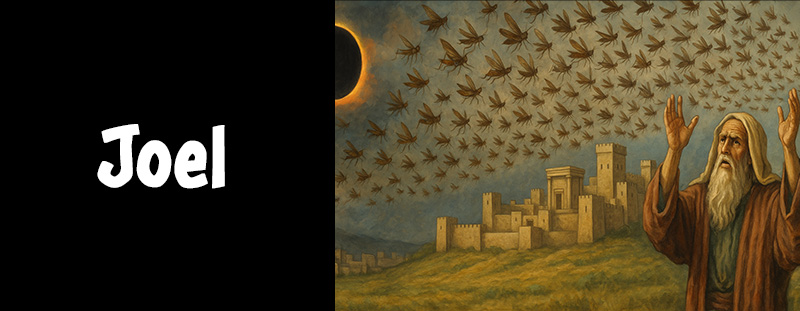🔽 Click here to read the KJV 🔽
¹ The word of the Lord that came to Joel the son of Pethuel.
² Hear this, ye old men, and give ear, all ye inhabitants of the land. Hath this been in your days, or even in the days of your fathers?
³ Tell ye your children of it, and let your children tell their children, and their children another generation.
⁴ That which the palmerworm hath left hath the locust eaten; and that which the locust hath left hath the cankerworm eaten; and that which the cankerworm hath left hath the caterpiller eaten.
⁵ Awake, ye drunkards, and weep; and howl, all ye drinkers of wine, because of the new wine; for it is cut off from your mouth.
⁶ For a nation is come up upon my land, strong, and without number, whose teeth are the teeth of a lion, and he hath the cheek teeth of a great lion.
⁷ He hath laid my vine waste, and barked my fig tree: he hath made it clean bare, and cast it away; the branches thereof are made white.
⁸ Lament like a virgin girded with sackcloth for the husband of her youth.
⁹ The meat offering and the drink offering is cut off from the house of the Lord; the priests, the Lord’s ministers, mourn.
¹⁰ The field is wasted, the land mourneth; for the corn is wasted: the new wine is dried up, the oil languisheth.
¹¹ Be ye ashamed, O ye husbandmen; howl, O ye vinedressers, for the wheat and for the barley; because the harvest of the field is perished.
¹² The vine is dried up, and the fig tree languisheth; the pomegranate tree, the palm tree also, and the apple tree, even all the trees of the field, are withered: because joy is withered away from the sons of men.
¹³ Gird yourselves, and lament, ye priests: howl, ye ministers of the altar: come, lie all night in sackcloth, ye ministers of my God: for the meat offering and the drink offering is withholden from the house of your God.
¹⁴ Sanctify ye a fast, call a solemn assembly, gather the elders and all the inhabitants of the land into the house of the Lord your God, and cry unto the Lord,
¹⁵ Alas for the day! for the day of the Lord is at hand, and as a destruction from the Almighty shall it come.
¹⁶ Is not the meat cut off before our eyes, yea, joy and gladness from the house of our God?
¹⁷ The seed is rotten under their clods, the garners are laid desolate, the barns are broken down; for the corn is withered.
¹⁸ How do the beasts groan! the herds of cattle are perplexed, because they have no pasture; yea, the flocks of sheep are made desolate.
¹⁹ O Lord, to thee will I cry: for the fire hath devoured the pastures of the wilderness, and the flame hath burned all the trees of the field.
²⁰ The beasts of the field cry also unto thee: for the rivers of waters are dried up, and the fire hath devoured the pastures of the wilderness.
🌾 A Nation Stripped Bare: God’s Warning Through Locusts 🌾
“That which the palmerworm hath left hath the locust eaten; and that which the locust hath left hath the cankerworm eaten; and that which the cankerworm hath left hath the caterpiller eaten.” – Joel 1:4
Joel Chapter 1 opens with a haunting vision of complete desolation. The land is ravaged by wave after wave of locusts, stripping away every green thing in sight. This is not merely a natural disaster—it’s a divine message, a warning from God calling His people to return to Him with sorrow and urgency. Through the prophet Joel, the Lord uses physical destruction as a spiritual alarm clock to awaken a wayward nation.
The tone of the chapter is urgent and lamenting. Every class—elders, priests, farmers, and even the drunkards—are summoned to observe the destruction and consider their ways. Joel does not offer solutions in this first chapter. Instead, he sets the stage for repentance by presenting the severity of judgment.
📜 Structure of Joel Chapter 1
Verses 1–4: The Locust Invasion Described
Joel recounts a catastrophic plague: successive swarms of locusts devour the land. Each insect represents escalating destruction—palmerworm, locust, cankerworm, and caterpillar. The scene reflects how unchecked sin brings progressive ruin. This opening serves as a call to remember, to “tell ye your children of it” (v.3), underscoring the lasting impact of divine judgment.
Verses 5–7: A Wake-Up Call to the Drunkards
Those lost in worldly indulgence are called to “weep and howl” as their source of pleasure—the vine—is cut off. The drunkards symbolize a people dulled by comfort and distraction. The vine and fig tree, traditional symbols of peace and prosperity (see Micah 4:4), are stripped bare, revealing the depth of judgment.
Verses 8–12: Mourning Over a Barren Land
Joel paints a portrait of a land in sorrow: trees wither, fields are wasted, joy withers away from the sons of men. The fig tree, pomegranate, palm, and apple tree—all fruitful symbols of blessing—are dried up. This lamentation serves not only to depict destruction but also to urge God’s people to recognize the spiritual drought that parallels the physical one.
Verses 13–14: A Sacred Assembly Called
The priests are commanded to gird themselves with sackcloth and to sanctify a fast. Joel urges national repentance, saying, “cry unto the Lord.” This summons is the chapter’s first step toward redemption, highlighting the role of spiritual leaders in guiding a nation back to God (see Cloud of Witnesses).
Verses 15–20: The Day of the Lord and a Plea for Mercy
Joel declares, “Alas for the day! for the day of the Lord is at hand.” The locust plague is a foreshadowing of even greater judgment. The prophet cries out, not only for the people but on behalf of the beasts of the field. Even creation groans under the weight of judgment (see Romans 8:22). Joel’s prayer is a plea for God’s mercy amidst devastation.
💡 Key Themes
✨ The Day of the Lord as Judgment
Joel introduces the “Day of the Lord”—a future time of divine reckoning. This chapter portrays it not as distant prophecy, but as a present unfolding, urging us to live with spiritual urgency.
✨ Destruction as a Wake-Up Call
Natural disasters, when viewed through a spiritual lens, are moments to reevaluate one’s heart. Joel sees the locusts not as coincidence, but as God’s hand calling His people to return.
✨ Corporate and Individual Repentance
From elders to farmers, no one is exempt. Joel shows that repentance must be both communal and personal for healing to begin (see FAQ Page).
👤 Key People
- Joel – The prophet, likely ministering in Judah, delivers God’s warning with clarity and poetic intensity.
- Priests – Spiritual leaders who are called to model repentance.
- Elders and Citizens – All are summoned to reflect on the devastation and return to the Lord.
🔥 Why This Chapter Matters
Joel 1 reminds us that God sometimes allows devastation not to destroy us, but to awaken us. The chapter confronts the reader with the reality of judgment and the need for a repentant heart. It shows that prosperity is fragile and that spiritual neglect can bring national and personal ruin.
💭 Let’s Reflect
- Has God used a season of loss to get your attention?
- What “locusts” have devoured your peace, and what message might God be speaking through them?
- Are you ready to sanctify a fast and cry out to the Lord?
❓Ready to Go Deeper?
👉 Click here to begin reading Joel chapter 2
Or, if you’d like to jump to a specific chapter in Joel, simply click the chapter number below:

